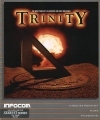Trinity
First posted on 14 January 2010. Last updated on 15 April 2010.

|
| Trinity is an example of interactive fiction that tries to deliver a social message about the danger of nuclear warfare. |
In Trinity, you play a tourist visiting Kensington Gardens in England. Unfortunately, your trip is rudely interrupted by the global superpowers that are having a bit of a nuclear tiff. Before it can totally ruin your vacation, you are whisked down a metaphorical rabbit hole into a surreal land. Soon, you discover this land is actually a nexus linking various sites that are significant to the history (sometimes future history) of nuclear weapons.
Though there is not much of a story in Trinity, there is a strong ambience. There is no plot to drive you on through the game, just your own curiosity and the challenge of the puzzles. The hole that is supposedly filled by a story is instead occupied by a message, maybe just a feeling. Strangely, it seems that if you play the game well and solve the puzzles without dying or fumbling about too much, then you may actually miss the significance of a site and thus miss out a chunk of that message.
The nexus is a wonderful wonderland inspired by Lewis Carroll. Contrasting that, the nuclear sites are starkly realistic. Much of the charm of the game comes from the many internal connections made within the game, much like the cult television series The Prisoner. Trinity does not say much, but few adventures emote more.
Penned by Brian "Professor" Moriarty, the writing in Trinity is terse but surprisingly rich. It conveys the essence of a scene or object in just a few simple sentences. Sometimes, it seems like more description is wanted, but it is a fine line between effective writing and tedious, purple prose in interactive fiction.
An uncommon feature of the game is the occasional presentation of boxed quotes when you examine an object or complete some task. These are quotes from famous people or bits of well-known poetry. It is another way Trinity creates its distinctive ambience.
The puzzles start off easy, but they quickly become difficult once you leave the Kensington Gardens. They are sometimes fiendishly clever, and, in the tradition of the era, grossly unfair. Sudden death lurks around many corners. Moreover, you have to die to figure out how to proceed. There are also long dead ends, where the game becomes unwinnable without killing you off. Frequent saving and restoring are necessary and highly advised.
Complicating this difficulty and unfairness is a time limit through some parts of the game. This is not a real-time limit (so you do not have to type quickly) but a turn limit. Each turn advances a game clock by some amount, so that events proceed whether you are ready or not. You must repeatedly play, die, and restore, until you figure out how to solve the various puzzles, and then you must replay it all again with no wasted actions in order to beat the clock. However, you do want to see the clock run out, because that gives you more of the game's message.
The game is structured into 3 acts. The first is an easy introduction section in Kensington Gardens. The second is the more difficult nexus with its attached historical nuclear sites. The third is a difficult and timed (so to speak) section at Trinity, New Mexico—the site of the first atomic explosion. It is possible to advance between acts without having all the necessary inventory items, thus leaving you stuck in the end.
The puzzles are well structured, mostly non-linear within the acts. Since there is little to no plot to get in the way, the open play works well. The only problem is that some sections are more linear than they seem, requiring the fruits of other puzzles and killing you if you have not done those other parts first.
If you go into Trinity aware of the unfairness and expecting to do a lot of saving and restoring, then that unfairness just becomes a challenging part of the game. While the puzzles are unfair in terms of sudden death, necessary resurrection, and long dead ends, they are fair in that they follow the logic of their locales. The solutions all make sense in hindsight, even when there is some arbitrary magic involved.
To me, the message in Trinity falls flat. It is too simplistic and perhaps too much preaching to the choir. However, it is undeniably there; this is not just a simple sequence of events, but a philosophical exposition. That is rare enough in adventure games to be worthwhile just for its presence.
